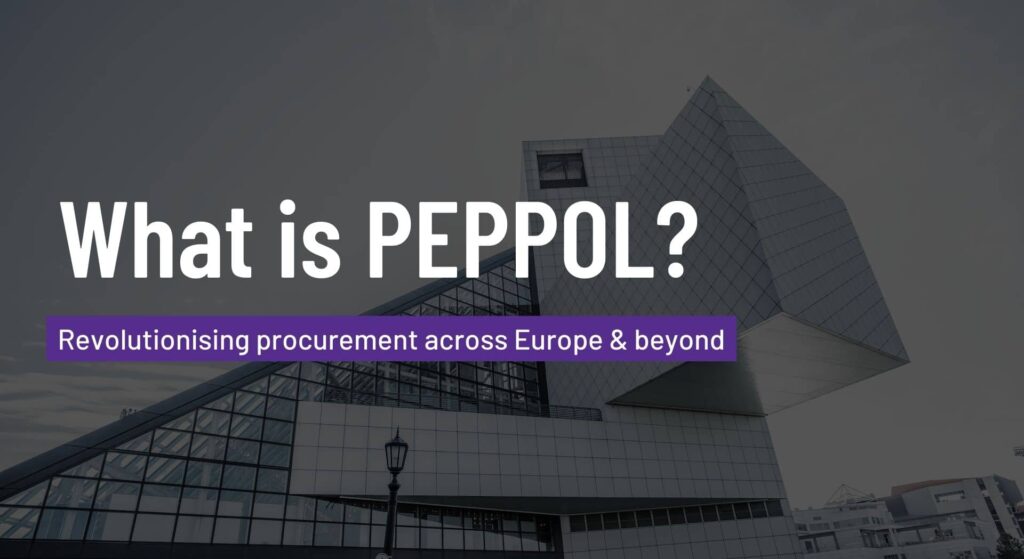In an increasingly interconnected world, efficient and secure communication between businesses and government entities is crucial for smooth operations and economic growth. PEPPOL, which stands for Pan-European Public Procurement Online, is a groundbreaking initiative that aims to revolutionise the way organisations exchange electronic documents and streamline procurement processes across Europe and beyond.
PEPPOL was born out of the need to simplify and standardise the electronic procurement processes across European countries. Launched in 2008 by a consortium of European public procurement agencies and organisations, PEPPOL aimed to eliminate barriers related to cross-border procurement and facilitate seamless electronic document exchange.
Key components of PEPPOL
- PEPPOL eDelivery Network: At the heart of PEPPOL lies its eDelivery Network, a secure and standardised infrastructure that enables the exchange of various types of electronic documents, including invoices, purchase orders and shipping notices. The network acts as a digital bridge, allowing businesses, government entities and service providers to communicate effortlessly.
- PEPPOL Business Interoperability Specifications (BIS): These specifications define the standardised formats and protocols that must be adhered to when creating and transmitting electronic documents. This ensures that data exchanged through PEPPOL remains consistent and compatible across different systems.
- PEPPOL Directory: The PEPPOL Directory functions as a centralised repository of information about participating organisations, their identification numbers and the services they offer. This directory helps parties involved in the electronic exchange of documents locate and connect with their desired trading partners.
Benefits of PEPPOL
PEPPOL eliminates the need for manual data entry and paper-based processes, significantly reducing the risk of errors and accelerating transaction times. By streamlining procurement and document exchange processes, organisations can save money on administrative tasks, postage and storage as well as the ultimate cost of errors that may occur.
With global trade comes global communication challenges, PEPPOL enables seamless cross-border procurement by harmonising standards and facilitating communication between entities from different countries. Similarly, many governments and public procurement agencies require the use of PEPPOL for electronic invoicing and procurement to ensure compliance with legal and regulatory frameworks.
Use cases
- E-Invoicing: PEPPOL can be used for electronic invoicing, allowing suppliers to send invoices in a standardised format directly to the buyers’ financial systems. This reduces manual data entry, minimises errors and speeds up payment processing.
- Ordering: Buyers can use PEPPOL to send electronic purchase orders to their suppliers, accelerating the order-to-delivery process and helping in better inventory management.
- Shipping and Logistics: PEPPOL can be utilised for exchanging transport-related messages, such as shipping instructions, tracking information and customs declarations to enhance visibility into the supply chain and ensure smoother movement of goods.
- Public Procurement: Government agencies and public sector organisations can use PEPPOL to conduct procurement activities electronically, from publishing tender notices and receiving bids to awarding contracts – streamlining the procurement process and making it more transparent.
- Supplier Onboarding: Organisations can use PEPPOL to onboard new suppliers more efficiently. Suppliers can provide their business information and documentation electronically to reduce paperwork and admin burden.
- E-Reporting and Compliance: Businesses can use PEPPOL to submit regulatory reports and compliance documents to government authorities, ensuring timely and accurate reporting while reducing administrative overhead.
- Cross-Border Trade: PEPPOL facilitates cross-border trade by providing a standardised platform for exchanging trade-related documents, such as certificates of origin, customs declarations and import/export documentation.
- E-Archiving: PEPPOL can serve as a secure and standardised platform for archiving electronic procurement documents, ensuring legal compliance and providing easy access for audit purposes.
Implementing PEPPOL
To become a part of the PEPPOL network, organisations need to connect through a certified PEPPOL Access Point provider. These providers offer the necessary technical infrastructure to enable secure document exchange – speak to Key Digital for advice and technical support.
Businesses must ensure that their internal systems and processes are aligned with PEPPOL’s interoperability specifications to facilitate seamless data exchange. Organisations need to register their information in the PEPPOL Directory to be discoverable by other parties for electronic document exchange.
PEPPOL’s impact extends beyond Europe, with countries around the world expressing interest in adopting its principles to improve their own procurement and e-invoicing systems. As the digital economy continues to grow, PEPPOL’s standardised approach to electronic document exchange has the potential to revolutionise global trade and foster greater collaboration among businesses and governments.
In a rapidly evolving business landscape, embracing innovative solutions like PEPPOL is essential for organisations seeking to enhance efficiency, reduce costs and improve communication. By offering a standardised framework for electronic document exchange, PEPPOL paves the way for a more interconnected and streamlined future, benefiting businesses and governments alike. As PEPPOL’s influence continues to expand, it holds the promise of transforming the way we do business on a global scale.
Please get in touch for any further advice or support regarding PEPPOL and its applications.
